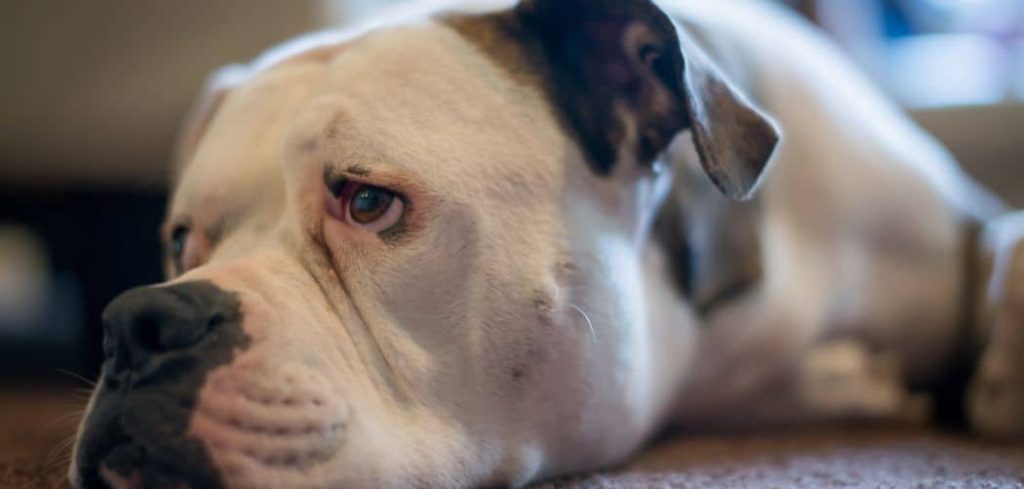When your dog is panting and breathing hard, it can be alarming and leave you wondering whether it’s simply due to exercise or something more serious.
While mild panting can be normal, heavy breathing paired with distress can indicate underlying health problems that need attention.
We outline the common reasons why your dog is panting and breathing hard, what you can do at home, and when to seek veterinary help.
Dog Panting and Breathing Hard — Why It Happens
Dogs pant and breathe hard to regulate temperature and oxygen levels, but persistent or severe symptoms often signal a medical issue. Overheating, respiratory disease, heart problems, allergic reactions, and even pain can all contribute to rapid or labored breathing. Stress, anxiety, or environmental factors like heat and humidity may also exacerbate the problem.

Dog Panting and Breathing Hard: Common Causes
Heatstroke
Heatstroke occurs when a dog’s body temperature rises dangerously high, often due to hot weather, overexertion, or being left in a warm environment.
Panting becomes rapid and intense as the body tries to cool itself.
You may also notice drooling, bright red gums, weakness, vomiting, or even collapse.
This is a life-threatening emergency, as prolonged overheating can damage organs and lead to death.
Read more: Dog breathing heavily and not eating (Here’s why)
Heart Disease
Heart disease, including congestive heart failure, can cause dogs to breathe hard and pant because the heart cannot pump efficiently, leading to fluid buildup in the lungs.
Affected dogs may tire easily, cough (especially at night), and seem restless when lying down. Without prompt veterinary care, the condition can quickly worsen.
Respiratory Infections
Conditions like pneumonia, bronchitis, or kennel cough can cause rapid, labored breathing as the respiratory system struggles to function.
Signs often include coughing, nasal discharge, lethargy, and loss of appetite. Depending on the cause, respiratory infections can progress quickly and require antibiotics or other targeted treatments.
Pain or Injury
Dogs in pain may pant and breathe heavily as part of their stress response. This could stem from injuries, arthritis flare-ups, abdominal pain, or post-surgical discomfort.
If panting is accompanied by restlessness, whining, or reluctance to move, pain should be considered and addressed urgently.
Allergic Reactions
Severe allergic reactions (anaphylaxis) can cause swelling of the airways, leading to breathing difficulty and frantic panting.
Other signs may include facial swelling, hives, drooling, vomiting, or sudden collapse. This requires emergency veterinary intervention.
Anxiety or Stress
Some dogs pant and breathe hard when anxious, stressed, or fearful. Triggers can include thunderstorms, fireworks, car rides, or separation from their owner.
While stress-induced panting is not immediately dangerous, chronic anxiety can impact a dog’s well-being and may require behavioral support or medication.
What to Do If Your Dog Is Panting and Breathing Hard
First, move your dog to a calm, cool, and quiet environment. Offer fresh water and allow them to rest. If overheating is suspected, use cool (not cold) water on their paws and belly, and provide airflow with a fan.
Avoid exercise until breathing normalizes. Monitor their gums — pale, blue, or very bright red gums can indicate poor oxygenation and require immediate care.
If anxiety is a possible trigger, try calming techniques such as gentle petting, soothing music, or a safe, quiet space.
For mild cases that resolve quickly, observation may be enough. However, if the breathing difficulty persists or worsens, seek veterinary advice promptly.
When to Call or Visit Your Vet
You should seek immediate veterinary care if your dog:
-
Has breathing difficulty that doesn’t improve within minutes of rest.
-
Shows signs of distress like wheezing, choking, or collapse.
-
Has pale, blue, or brick-red gums.
-
Cannot stand, is disoriented, or appears weak.
-
Is a brachycephalic breed (e.g., Bulldog, Pug) with worsening symptoms.
Even if symptoms appear mild, chronic or recurring episodes of heavy breathing should always be evaluated to rule out heart, lung, or systemic issues.
Key Takeaway
Panting and breathing hard in dogs can be normal after exercise or excitement, but persistent or severe symptoms often indicate a medical problem.
Quick action can make the difference, especially in emergencies like heatstroke or allergic reactions.
Always monitor your dog closely, provide a safe environment, and involve your vet when symptoms are concerning. Your attentiveness can help keep your dog safe, comfortable, and healthy.
